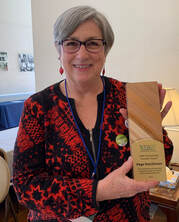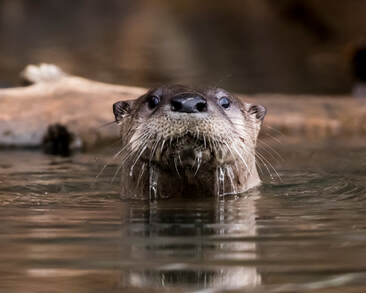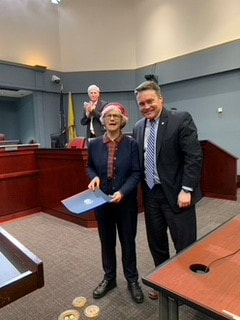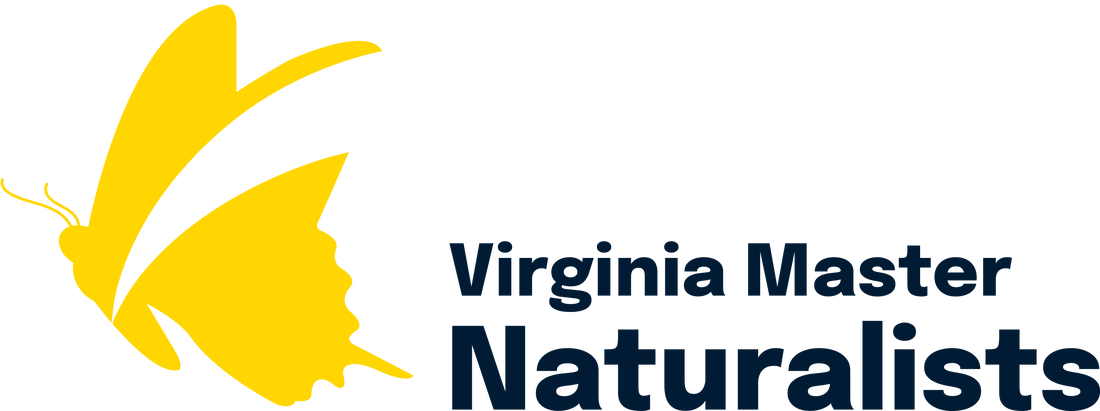 Page Hutchinson (chapter advisor, VMN-Rivanna Chapter) was awarded the VAEE Outstanding Educator award at the Virginia Association for Environmental Education conference in February. Photo by M. Prysby
Page Hutchinson (chapter advisor, VMN-Rivanna Chapter) was awarded the VAEE Outstanding Educator award at the Virginia Association for Environmental Education conference in February. Photo by M. Prysby Rivanna Chapter Advisor is the VAEE Outstanding Educator
Page Hutchinson, chapter advisor for the VMN-Rivanna Chapter, was awarded the Outstanding Educator award by the Virginia Association for Environmental Education. She was recognized for her long history of EE work and her many accomplishments over the years as she coordinated Project Wet and Project Learning Tree, several watershed education institutes and professional development academies, three VAEE state conferences, and more. Page is currently the State Coordinator for Project Learning Tree with the Virginia Department of Forestry.
Page Hutchinson, chapter advisor for the VMN-Rivanna Chapter, was awarded the Outstanding Educator award by the Virginia Association for Environmental Education. She was recognized for her long history of EE work and her many accomplishments over the years as she coordinated Project Wet and Project Learning Tree, several watershed education institutes and professional development academies, three VAEE state conferences, and more. Page is currently the State Coordinator for Project Learning Tree with the Virginia Department of Forestry.
Riverine Master Naturalists Give the VCU Rice Rivers Center a Makeover
The VCU Rice Rivers Center, Virginia Commonwealth University's environmental research field station on the James River, needed help. The goal? To transform the weedy, overgrown, neglected garden and landscape areas surrounding the education center into native plant havens for pollinators and other wildlife. The Rice Center's former Director, newly recruited to teach the Riverine training course on birds, reached out for help. They would fund all of the costs for the plantings if the Riverines could commit to devising and implementing the plan. Since The Rice Center has been a great ally to the Master Naturalists, hosting work on oyster shell recycling as well as field trips for trainees, it was a great match.
Nearly 6 months after the idea was first floated, the project received approval. A 2018 Riverine training class graduate, who owns Garden Gate Nursery native plants, worked closely with the project leader to develop the plans. All plant materials selected were native to Charles City County, where the Rice Center sits, with the exception of a few long-blooming non-invasive annual flowering plants of particular benefit to pollinators (e.g. Zinnia, Cosmos) Plants were selected based on wildlife value, season of bloom and ability to thrive with little coddling.
And then, the coronavirus. Group work sessions were pared down to a handful, or fewer, volunteers, all committed both to the project and to the need for social distancing. The dedicated band of Riverines cleared brush, trimmed overgrown shrubs, dug endless holes in unfriendly soil, planted, seeded and watered. Mason Bee boxes, built by some of the chapter members, were added as well.
The next phase, just launched, will be documenting bloom times, noting any use by pollinators, and keeping the plantings alive (which has been made more difficult by a voracious local groundhog). Adjustments will be made along the way, but the foundation is set for this to be a showcase, both for The Rice Center and for the Riverine Chapter of Virginia Master Naturalists.
Check out the slide show below to see the volunteers in action!
--Text and photos submitted by Sandee Bailey, VMN-Riverine Chapter
The VCU Rice Rivers Center, Virginia Commonwealth University's environmental research field station on the James River, needed help. The goal? To transform the weedy, overgrown, neglected garden and landscape areas surrounding the education center into native plant havens for pollinators and other wildlife. The Rice Center's former Director, newly recruited to teach the Riverine training course on birds, reached out for help. They would fund all of the costs for the plantings if the Riverines could commit to devising and implementing the plan. Since The Rice Center has been a great ally to the Master Naturalists, hosting work on oyster shell recycling as well as field trips for trainees, it was a great match.
Nearly 6 months after the idea was first floated, the project received approval. A 2018 Riverine training class graduate, who owns Garden Gate Nursery native plants, worked closely with the project leader to develop the plans. All plant materials selected were native to Charles City County, where the Rice Center sits, with the exception of a few long-blooming non-invasive annual flowering plants of particular benefit to pollinators (e.g. Zinnia, Cosmos) Plants were selected based on wildlife value, season of bloom and ability to thrive with little coddling.
And then, the coronavirus. Group work sessions were pared down to a handful, or fewer, volunteers, all committed both to the project and to the need for social distancing. The dedicated band of Riverines cleared brush, trimmed overgrown shrubs, dug endless holes in unfriendly soil, planted, seeded and watered. Mason Bee boxes, built by some of the chapter members, were added as well.
The next phase, just launched, will be documenting bloom times, noting any use by pollinators, and keeping the plantings alive (which has been made more difficult by a voracious local groundhog). Adjustments will be made along the way, but the foundation is set for this to be a showcase, both for The Rice Center and for the Riverine Chapter of Virginia Master Naturalists.
Check out the slide show below to see the volunteers in action!
--Text and photos submitted by Sandee Bailey, VMN-Riverine Chapter
The Shenandoah Saw-whet is Now Available
The Shenandoah Chapter has launched a new newsletter, the Shenandoah Saw-whet, available on their website. It is named for the Saw-whet owl, a species of greatest conservation need in the Shenandoah Valley. An especially nice feature of the newsletter is the "Flora and Fauna Calendar", which lists seasonally occurring natural history events, like great blue herons nesting at a local rookery and bluebells in flower at the nearby state park.
--Submitted by Tim Koppenhaver, Outreach Chair in the VMN-Shenandoah Chapter
The Shenandoah Chapter has launched a new newsletter, the Shenandoah Saw-whet, available on their website. It is named for the Saw-whet owl, a species of greatest conservation need in the Shenandoah Valley. An especially nice feature of the newsletter is the "Flora and Fauna Calendar", which lists seasonally occurring natural history events, like great blue herons nesting at a local rookery and bluebells in flower at the nearby state park.
--Submitted by Tim Koppenhaver, Outreach Chair in the VMN-Shenandoah Chapter
 River otter observed and photographed by Glen Mitchell (VMN-Roanoke Valley Chapter).
River otter observed and photographed by Glen Mitchell (VMN-Roanoke Valley Chapter). Roanoke Valley Master Naturalist Volunteer Collaborates with Virginia State Parks
VMN volunteer Glen Mitchell in the Roanoke Valley Chapter does occasional photo blogging for Virginia State Parks. His latest submission has some delightful photos of river otters he and his wife encountered during a recent paddling trip at Fairy Stone State Park.
--Submitted by George Devlin, Chapter Advisor, VMN-Roanoke Valley Chapter and VDEQ
VMN volunteer Glen Mitchell in the Roanoke Valley Chapter does occasional photo blogging for Virginia State Parks. His latest submission has some delightful photos of river otters he and his wife encountered during a recent paddling trip at Fairy Stone State Park.
--Submitted by George Devlin, Chapter Advisor, VMN-Roanoke Valley Chapter and VDEQ
 Nora Palmatier with Matt de Ferranti, recognized upon her retirement from the Urban Forestry Commission.
Nora Palmatier with Matt de Ferranti, recognized upon her retirement from the Urban Forestry Commission. Arlington Regional Master Naturalist Volunteers Recognized for Urban Forestry and Native Plant Work
Nora Palmatier Recognized for Urban Forestry Commission Work
From Arlington County Board member, Matt de Ferranti’s speech recognizing Nora Palmatier on her retirement from the Urban Forestry Commission, February 25, 2020:
. . .
During the 13 years that Nora has served actively on the Urban Forestry Commission, which included several years as its Chair, she has also been a long-standing member, leader and former Chair of the Tree Stewards of Arlington/Alexandria which has inspired and taught many Arlington residents about the need and proper care of trees. Along with fellow [Arlington Regional] Master Naturalist (ARMN) Caroline Haynes, Nora participated in developing the “Choking Hazard” campaign that reached out to Arlingtonians about the destructive effects of English ivy on trees.
In 200, Nora was in the first graduating class of ARMN. She served as the Urban Forestry Commission representative on the 4 Mile Run Valley planning process.
She has served as a member and past Chair of the Northern Virginia Urban Forest Roundtable.
Nora . . . [worked] across disciplines, and with a wide range of residents to improve the urban tree canopy of Arlington County.
. . .
Her strong commitment to education, outreach and volunteerism is contagious, as she leads by example and motivates others to learn more, to get involved, and to “spread the word” on the benefits that trees provide. . . .
Nora Palmatier Recognized for Urban Forestry Commission Work
From Arlington County Board member, Matt de Ferranti’s speech recognizing Nora Palmatier on her retirement from the Urban Forestry Commission, February 25, 2020:
. . .
During the 13 years that Nora has served actively on the Urban Forestry Commission, which included several years as its Chair, she has also been a long-standing member, leader and former Chair of the Tree Stewards of Arlington/Alexandria which has inspired and taught many Arlington residents about the need and proper care of trees. Along with fellow [Arlington Regional] Master Naturalist (ARMN) Caroline Haynes, Nora participated in developing the “Choking Hazard” campaign that reached out to Arlingtonians about the destructive effects of English ivy on trees.
In 200, Nora was in the first graduating class of ARMN. She served as the Urban Forestry Commission representative on the 4 Mile Run Valley planning process.
She has served as a member and past Chair of the Northern Virginia Urban Forest Roundtable.
Nora . . . [worked] across disciplines, and with a wide range of residents to improve the urban tree canopy of Arlington County.
. . .
Her strong commitment to education, outreach and volunteerism is contagious, as she leads by example and motivates others to learn more, to get involved, and to “spread the word” on the benefits that trees provide. . . .
Toni Genberg's Native Plant Landscaping Featured
ARMN’s Toni Genberg was featured in YES! Magazine’s Feb 7, 2020 article, “How to Turn Your Yard Into an Ecological Oasis”). The piece highlighted Toni’s amazing yard of native plants featuring several of her photos, and how she was inspired to transform her space after a talk by Doug Tallamy, a professor of entomology at the University of Delaware. The article stressed how critical native species are to local wildlife and that even a few natives could significantly help local wildlife anywhere—even in densely-populated areas.
--Submitted by Kasha Helget, VMN-Arlington Regional Chapter
ARMN’s Toni Genberg was featured in YES! Magazine’s Feb 7, 2020 article, “How to Turn Your Yard Into an Ecological Oasis”). The piece highlighted Toni’s amazing yard of native plants featuring several of her photos, and how she was inspired to transform her space after a talk by Doug Tallamy, a professor of entomology at the University of Delaware. The article stressed how critical native species are to local wildlife and that even a few natives could significantly help local wildlife anywhere—even in densely-populated areas.
--Submitted by Kasha Helget, VMN-Arlington Regional Chapter


 RSS Feed
RSS Feed